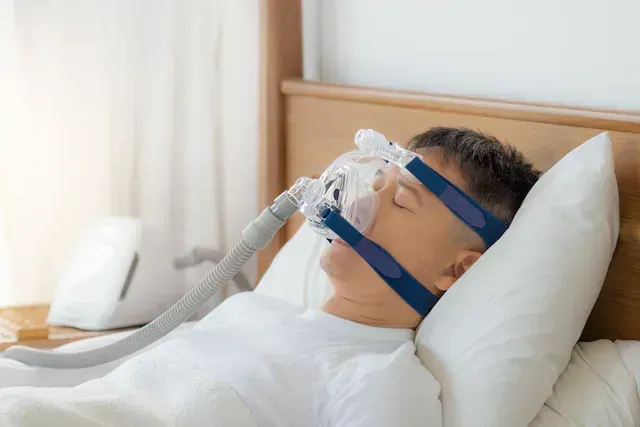Need a CPAP Alternative? Call: 717-995-3590
OFFICE PHONE: 717-995-3590
CPAP Alternatives
Snoring & Sleep Apnea Dentist located in Harrisburg, PA

CPAP Alternatives services offered in Harrisburg, PA
Nearly eight million people in the United States use continuous positive airway pressure (CPAP) to treat Obstructive Sleep Apnea (OSA). At Pennsylvania Dental Sleep Medicine in Harrisburg, Pennsylvania, snoring and sleep apnea dentist, Becky Fox, DMD, FAGD, D-ABDSM, offers CPAP alternatives.
Call our office today or use our online booking tool to request an appointment.
CPAP Alternatives Q & A
What are CPAP alternatives?
CPAP alternatives are optional treatments for sleep apnea.
Traditionally, doctors treated sleep apnea with continuous positive airway pressure (CPAP) therapy. In CPAP therapy, you wear a mask over your nose and mouth during sleep. The mask connects to a machine that emits a constant stream of oxygen, keeping your airways open.
Though effective, CPAP therapy causes many people to experience side effects like dry mouth, nasal passage sensitivity, bloating, and nosebleeds. CPAP alternatives can help you get a good night’s rest without these side effects.
Who should consider CPAP alternatives?
Consider CPAP alternatives at Pennsylvania Dental Sleep Medicine if you have sleep apnea and experience any of the following issues:
- Trouble wearing your CPAP mask and mask leads
- Chronic nasal congestion or sinus infections
- Dry mouth
- Nose bleeds
- Claustrophobia
- Nasal passage sensitivity
- Skin irritation or acne
- Bloating
- Frequent travel convenience
You might also benefit from CPAP alternatives if you’re a light sleeper and the sound of your CPAP machine prevents you or your bed partner from falling asleep.
What are some examples of sleep apnea alternatives?
The providers at Pennsylvania Dental Sleep Medicine may recommend several sleep apnea alternatives, including:
Healthy lifestyle changes
Many people with sleep apnea find that they rest more comfortably after losing a few pounds. If you’re overweight, excess fat can affect the size of your airways, making it more difficult to breathe. Losing weight can relieve pressure on your palate and help you sleep better.
Your provider might also recommend eating a nutritious diet, exercising regularly, and quitting smoking.

Oral Appliance Therapy
If you continue snoring or have difficulty sleeping, even after losing weight, your physician might prescribe an oral appliance that Dr. Becky Fox is happy to assist with.
Oral appliance therapy, or a mandibular advancement device, uses removable plastic mouthpieces to position your lower jaw forward. That helps open your airways, making it easier to breathe during sleep.
Sleep apnea surgery
Some people have soft tissue at the back of their throats that actually blocks their airways. If you have a physical obstruction and neither Oral Appliance Therapy nor CPAP are solutions, sleep apnea surgery from an ENT or oral surgeon might be necessary.
Hypoglossal nerve stimulator
Some patients with severe sleep apnea may be a candidate for an implantable device that stimulates the tongue throughout the night to push forward off the airway. This surgery is performed often by an ENT, and a pacemaker size device is implanted in the chest wall with electrical leads up to the base of the tongue.
Myofunctional Therapy
Myofunctional therapy is exercise for your tongue and loose tissue in the back of your throat. These exercises are not complicated, do not cost anything, and are easy to do throughout your day. Myofunctional therapy exercises can improve muscle tone to play an additional role in your combination therapy for OSA.
Positional Therapy
Positional Therapy may be helpful if your obstructive sleep apnea is significantly worse while laying on your back vs your side while sleeping. There are many positional therapy aid devices available to patients. They coach you to sleep on your side or physically prevent you from rolling onto your back throughout the night. Your provider may recommend this additional therapy for combination therapy with other treatments.
Which oral appliance will best benefit?
A specially-trained Sleep Apnea Dentist can determine the appropriate oral appliance that will most benefit you. After an oral exam and a discussion of your symptoms, your provider makes treatment recommendations, on an individual basis. Dentists who have received training specifically in this field will work with many different appliance designs for optimal compliance outcomes.
To explore CPAP alternatives call our office today or use our online booking tool to request an appointment.
Quick Links
All Rights Reserved | Pennsylvania Dental Sleep Medicine


